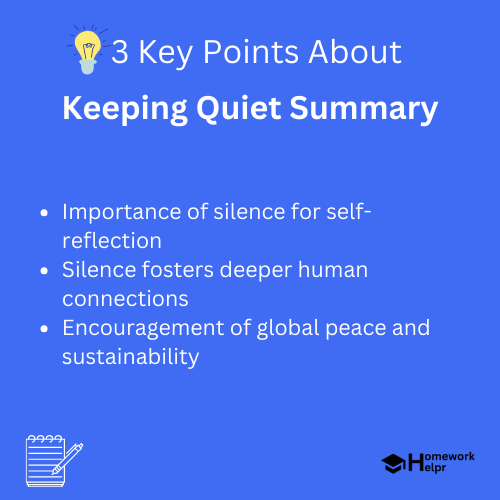📝 Summary
In a chaotic world, Pablo Neruda’s poem “Keeping Quiet” emphasizes the importance of silence and introspection. It invites individuals to pause and reflect on their actions, promoting deeper understanding and connection with others and the environment. The poem underlines that embracing quiet moments can enhance human interaction, foster empathy, and lead to personal growth. Ultimately, Neruda advocates for a collective call for global peace and sustainability, urging us to appreciate nature and strengthen our relationships through the practice of stillness.
Keeping Quiet: A Summary
In a world that often thrives on chaos and noise, the poem “Keeping Quiet” by Pablo Neruda encourages a moment of stillness and reflection. The essence of the poem focuses on the importance of taking a pause and contemplating our actions and their impacts on ourselves and the world around us. Neruda‚’ powerful imagery and profound insights serve as a reminder of the value of silence and the need for introspection.
Understanding the Theme of Silence
At its core, “Keeping Quiet” promotes the theme of silence as a mechanism for achieving deeper understanding and connection. Through this silence, individuals are encouraged to engage in self-reflection and consider their relationships with others and their environment.
The poem suggests that if everyone initiated a moment of quiet, there would be a noticeable shift in human interaction. This collective stillness would allow people to acknowledge their personal and social problems. Together, they would begin to understand the impact of their actions and the importance of harmony.
Definition
Introspection: The examination of one‚’ own thoughts and feelings. Chaos: A state of utter confusion and disorder.
The Importance of Reflection
Neruda‚’ invitation to ‚Äúkeep quiet” acts as a call to reflect on the noise of our daily lives. In a fast-paced world filled with distractions, the poem emphasizes the relevance of slowing down to reflect on our decisions and their consequences. By engaging in quiet contemplation, individuals can develop a stronger sense of empathy towards others and the environment.
Reflection also plays a critical role in identifying personal growth and change. The process encourages not only self-awareness but also the realization of our interconnectedness with all living beings. When we take the time to listen—both to ourselves and to others—we can foster important relationships that lead to collective healing.
Examples
1. Consider a time when you felt overwhelmed by noise, such as a busy classroom or a crowded marketplace. 2. Try to remember how you felt during a moment of calm, like sitting in a peaceful park.
The Role of Human Connection
Neruda also highlights the need for understanding among people through his poetic reflections. By embracing silence, individuals can enhance their connections with one another. The act of listening—truly listening—can create a platform for deeper communication and the resolution of conflicts.
The poem emphasizes that silence can often speak louder than words. It suggests that even in moments of tension or disagreement, finding quietude allows for a greater capacity to listen and understand diverse perspectives. In such moments, we can learn to appreciate the feelings of those around us, enabling us to act with kindness and empathy.
❓Did You Know?
Did you know that some scientists believe that spending time in silence can actually enhance brain function and creativity?
The Power of Nature and Environment
Furthermore, “Keeping Quiet” draws attention to the connection between humans and their environment. In an age of rapid industrialization and environmental degradation, the poem can be interpreted as a plea for sustainability and respect for nature. Keeping quiet allows us to truly hear the sounds of nature, appreciate its beauty, and recognize our role in preserving it.
As we become more aware of our surroundings through silence, the significance of protecting our planet may resonate more deeply. We might reflect on our own lifestyles and make conscious choices to minimize our impact on Earth. Nature teaches us valuable lessons, and taking a moment of quiet can facilitate these important realizations.
The Call for Global Peace
At a broader level, Neruda‚’ message can also be interpreted as an appeal for global peace and coexistence. In a world marred by conflict and violence, the poet calls for a collective embracing of quietude as a method to resolve differences. It prompts individuals to think critically about the essence of peace and how silence can foster understanding among opposing viewpoints.
Through the notion of keeping quiet, we can approach sensitive matters without the immediate rush to argue or defend. It allows for a breathing space where dialogue can occur, potentially leading to harmonious resolutions and shared goals.
Conclusion: Embracing Quietude in Our Lives
“Keeping Quiet” is not merely a poem about silence; it embodies a profound philosophy that encourages personal introspection, empathy, connection, and environmental awareness. As school students and children, embracing the essence of this teaching can transform your everyday experiences. Dedicating moments in your day to pause and reflect can significantly enhance your understanding of yourself and your relationships with the world.
By taking time to embrace silence, we can work towards fostering a harmonious community where peace, compassion, and sustainability reign. Whether it‚’ in your classroom, your home, or the wider world, take inspiration from Neruda‚’ message and commit to a practice of quietude‚Äîwho knows the extraordinary changes it might lead to!

Related Questions on Keeping Quiet Summary
What is the main theme of “Keeping Quiet”?
Answer: The poem emphasizes silence and introspection.
How can silence lead to personal growth?
Answer: It allows for self-reflection and empathy development.
What does the poem suggest about nature?
Answer: It encourages respect for nature and sustainability.
How can “Keeping Quiet” promote peace?
Answer: It fosters understanding and dialogue among opposing views.
